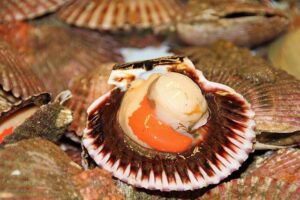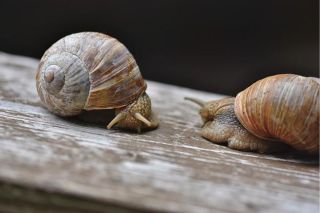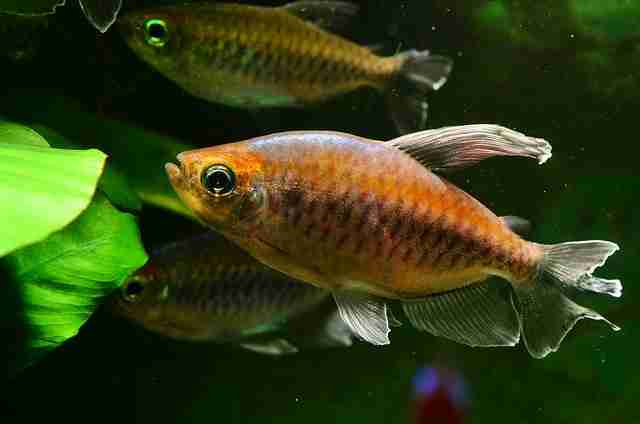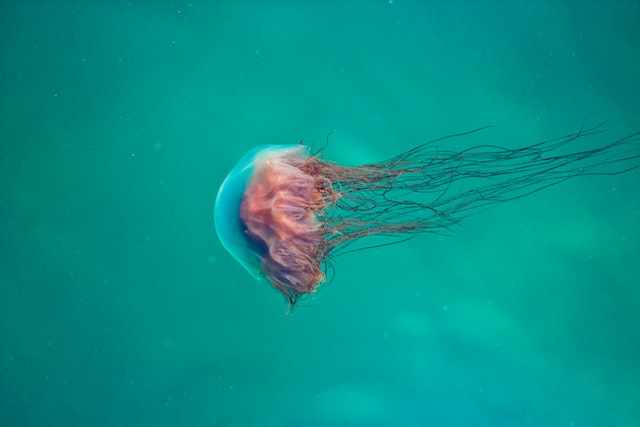Do Scallops Feel Pain? (Yes, But…)
Yes, scallops feel pain though it might not be exactly the same way humans do.
This has remained a long-standing argument in the scientific community in which a conclusive finding is still being sought.
Scallops may not feel and process pain in the way that higher animals like mammals do. But they likely feel pain. The fact that when touched, scallops close up demonstrates that they can process feelings of touch, and as such try to move away from danger.
In this article, we’ll answer questions regarding pain in scallops, why do scallops feel pain, and how they respond to pain.

How Do Shellfish Process Pain?
Shellfish process pain more rapidly than higher animals do. In vertebrates and higher animals, the withdrawal from a source of pain is affected by the transmission of impulses across a network of nerve fibers. However, the time between the impression of pain and reaction is slower in these higher animals.
That said, the network of nerves through which pain is processed in shellfish is structurally alike to those of higher animals.
In higher animals, nerve fibers fan out from the spinal cord to all parts of the body. These nerve fibers are known as peripheral neurons.
When any part of the body experiences pain, the stimulus is transmitted as an impulse across the peripheral neurons to the spinal cord via neurotransmitters. This causes a reflex arc to be formed, which ultimately leads to a rapid withdrawal of the affected body part from the source of pain.
In shellfish, a similar process plays out. When you touch a shellfish, the stimulus passes through a network of nerve fibers surrounding its body. But the withdrawal away from the source of touch is much more rapid in shellfish than in higher animals.
However, in vertebrates, the animal will continue to feel pain in the affected body part, moments after withdrawal from the painful stimulus, but no one sees the pain and only the affected animal suffers it. And there’s hardly a way we can know whether or not shellfish suffer this internal pain upon withdrawal from hurt.
Meanwhile, there’s an argument that the firing of nerve fibers and transmission of stimulus that cause reflex in shellfish is not enough evidence of pain. Especially because this happens too fast in shellfish compared to higher animals.
However, we cannot dismiss the possibility of internal suffering in shellfish after being exposed to hurt simply because there isn’t enough evidence yet to prove it.
Do Scallops Have A Nervous System?
Yes, scallops have a nervous system.
Just like most animals, the presence of a well-defined nervous system is demonstrated by the five senses which are the sense of sight, touch, smell, hearing, and taste. Three of these senses are easy to identify in scallops and they include the sense of touch, smell, and sight.
The other two, which are hearing and tasting might also be present in scallops but they are relatively hard to demonstrate.
Touching a scallop would make it close, and everyone can easily see that. This would not happen if it does not have a complex network of nerves that allows it to process stimuli from touch.
Putting a scallop in the same pond with a predator like a sea star would cause it to scamper to the edge as it tries to escape. This means it can smell the predator. And hence tries to run away in its struggle to stay alive.
To demonstrate the sight of scallops, cast a shadow of yourself on where the scallop is located in the sun, and watch, as it closes. Remove your shadow and it opens again after some time. This pretty much demonstrates that a scallop sees what happens around it and reacts accordingly.
Also, scientists have proven that the blue-green dots distributed across the body of a scallop are its eyes.
Furthermore, scallops can perceive vibrations in the water and can respond to them. So they can hear!
All these are proofs that scallops do in fact have a well-developed nervous system.
Do Scallops Feel Pain?
Yes, we strongly believe scallops feel pain.
Having carried out extensive research on the subject, scientists are now starting to lean toward the side that scallops feel pain. And this is more evident in the fact that their behavior meets certain requirements of pain though not ALL.
Before we go further, it is pertinent to define pain and explore the requirements an animal must meet in order for it to be said to feel pain.
Pain is the physical feeling of suffering and discomfort due to illness or injury.
What are the requirements of Pain?
- The animal must have a well-defined nervous system and sensory receptors.
- The animal must be able to respond to painful stimuli.
- It must develop a protective mechanism in the affected area, such as reduced use of that area
- And lastly, the feeling of suffering, owing to pain must be evident in that animal.
We can see that scallops meet most of these requirements, but the feeling of suffering might not be clear. Some reports claim that the withdrawal of scallops when touched or exposed to danger cannot necessarily be pain.
While scallops move very quickly away from pain, it has not been proven that they suffer afterward. This is why some scientists that scallops truly feel pain.
Why Do Scallops Feel Pain?
Scallops feel pain because they meet most of the requirements for feeling pain. These requirements are:
A well-developed nervous system
Scallops have a well-defined nervous system which allows them to enjoy a relatively nice quality of life.
- They have eyes are scattered across their mantle shells that allow them to see.
- They sense vibration in water which is pretty much a good hearing attribute.
- And they can smell predators and move away from them in water.
Hence we can say that they have a nice little nervous system.
Scallops are Nociceptive
Scallops quickly move away from points of touch and pain or close up their shells. To be able to do that, they must have a well-defined network of neurons that enable them to process the feeling of touch or danger and shift away from it. But scientists find it hard to gauge how much they suffer from the impression of pain. However, we cannot say that they do not suffer at all because the signs are not obvious.
How to Care For Scallops?
Scallops will, no doubt, make a great addition to your aquarium. However, taking care of them can be a bit hectic.
Here are tips to keep your scallops in optimum health in a tank.
Scallops feed via a means called filter feeding. And this involves passing both water and food into the body of the animal. Then the animal absorbs food out of the water using a sieve-like substance in its body. It digests the food and expels the water.
Being a filter feeder, Scallops will filter zooplankton and phytoplankton from water columns and digest them. They therefore would need a great deal of water flow to be able to bring food to them and carry wastes away from them.
Keep the water around medium flow, so things don’t get too turbulent and disturb the scallops. You also need to supply them constantly with zooplankton and phytoplankton so that they do not starve to death. You must also provide a good supply of calcium and other trace minerals to keep their shells healthy.
Try to keep the water condition unsullied as they are very sensitive to water quality.
Frequently Asked Questions
Is Scallop A Living Thing?
Yes. Scallop is a living thing. It is an invertebrate and belong to the phylum Mollusca. They are further classified as bivalves, which are a group of sea animals having a double shell. They possess all other qualities of living things including movement, respiration, nutrition, irritability, growth, excretion, and reproduction.
Do Scallops Suffer?
Maybe or maybe not. There’s no doubt scallop react to touch or try to get away from danger. However, there’s no evidence that show that they do indeed suffer, though we personally believe they suffer though it might not be in the way mammals do.
Are Scallops Alive When You Eat Them?
Scallops do not survive for long when taken out of water. They are usually sold frozen or shrunken, which means they are not alive when you eat them. However, it’s still possible to get a live scallop; you can tell it’s alive if the shell is closed. Don’t eat live scallops as they may be harboring bacteria.
Why Can’t Vegans Eat Scallops?
Vegans cannot eat scallops because scallops are animals and vegans only eat only plants. But there are many claims that seafoods like scallops are indeed vegan. But this is not accurate and doesn’t agree with the rules of veganism which only support eating foods derived from plant sources.
Conclusion: Do Scallops Feel Pain?
Whether or not Scallops feel pain has remained a long debate. However, recent discoveries have established that they indeed do feel pain, nonetheless, in a different (more rapid) way.
Being able to move away from points of pain and possessing a well-formed nervous system are clear evidences that scallops do in fact feel and process pain.





